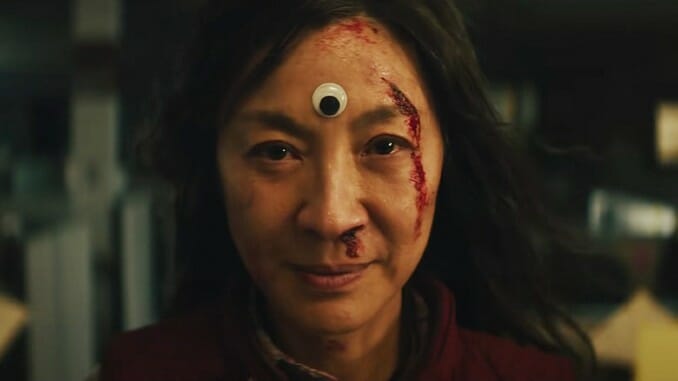
Science fiction is the favorite genre of many of us here at Paste. And Netflix has upped their sci-fi movies game over the last year and now includes several of our 100 Best Sci-Fi Movies of All Time. The catalog of streaming films is especially strong when it comes to 21st-century indie movies like Okja, Everything Everywhere all at Once and The Mitchells vs. The Machines, while being supported by Netflix originals such as Project Power or The Platform. It’s an exciting time for speculative fiction, whether you’re looking for alien arrivals, superheroes, space travel, technological dangers or imaginative glimpses at the future.
You can also check out all of our What to Watch on Netflix guides, updated each month.
Here are the 20 best sci-fi movies on Netflix:
1. Jurassic Park
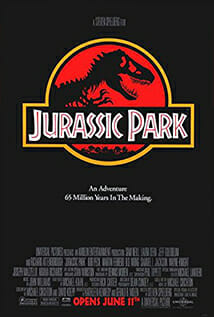 Year: 1994
Year: 1994
Director: Steven Spielberg
Stars: Sam Neill, Laura Dern, Jeff Goldblum, Richard Attenborough, Samuel L. Jackson, BD Wong, Wayne Knight
Rating: PG-13
Jurassic Park’s standing as a technical milestone in cinematic storytelling isn’t only dependent on its then-revolutionary use of computer generated imagery: The special effects look as groundbreaking and seamless today as they did 25 years ago. The magic behind the film’s ability to bring dinosaurs to life could be in Spielberg’s expertise in approaching special effects on a shot-by-shot basis, merging each sequence with reliable miniature and animatronic work, making the connective tissue between these tricks as unnoticeable as possible. More than an achievement, Jurassic Park is an infinitely fun action adventure that also manages to insert some prescient themes into the mix—like whether or not humanity should interfere, on a deeply intimate level, with Nature—affording a moral angle that the sequels have pretty much abandoned or just plain bungled so far. —Oktay Ege Kozak
2. The Matrix
 Year: 1999
Year: 1999
Director: Lana and Lilly Wachowski
Stars: Keanu Reeves, Laurence Fishburne, Carrie-Anne Moss, Hugo Weaving, Joe Pantoliano
Rating: R
There is little to add about what’s been already codified about the film that made cyberpunk not stupid—and therefore is the best cyberpunk movie of all time, amidst its many accomplishments—or that made Keanu Reeves a respectable figure of American kung fu, or that finally made martial arts films a seriously hot commodity outside of Asia. The story of a computer hacker who woke up to the reality that everything he knows is an illusion constructed to placate humanity under the reign of a super-race of robot squids, The Matrix is—next to the Wu-Tang Clan—what proved to a new generation that martial arts films were worth their scrutiny, and in that reputation is bred college classes, heroes’ journeys and impossible expectations for special effects. Even today we still have this film to thank for so much of what we love about modern kinetic cinema, about how malleable genius science fiction can be, about just how deeply our connection to mythmaking—to the religiosity of civilization’s symbols—can reach. This is our red pill; everything else is an illusion of greatness and everything else is an allusion to what the Wachowskis accomplished, including the two sequels—bloated and beautiful and unlike anything anyone could have expected from the relatively self-contained original—which in turn earned the distinction of setting the course for every multi-part franchise to come —Dom Sinacola
3. Everything Everywhere All At Once
 Year: 2022
Year: 2022
Director: Daniel Kwan, Daniel Scheinert
Stars: Michelle Yeoh, Stephanie Hsu, Ke Huy Quan, James Hong, Jamie Lee Curtis, Jenny Slate, Harry Shum Jr.
Rating: R
Everything Everywhere All At Once follows Evelyn Wang (Michelle Yeoh), a jaded, middle-aged laundromat owner who may or may not be involved in some minor tax fraud. Her tedious, repetitive life is thrown into total pandemonium, however, when her husband, Waymond (Ke Huy Quan)—or at least a version of him—alerts her to the existence of the multiverse on the elevator ride to an IRS meeting. He then explains that a powerful villain named Jobu Tupaki is in the process of constructing a universe-destroying force that only Evelyn has the ability to stop. And so Evelyn reluctantly plunges headfirst into the multiverse. The facts: There are an infinite number of universes that exist simultaneously, containing just about anything you could possibly imagine. The rules: To acquire different skills, you must picture a universe in which you inhabit that skill, whether it be inhumanly strong pinky fingers or a mastery of knife-fighting. (If you can think it up, it exists.) What follows, then, are roughly 140 frenetic minutes filled to the brim with dense, complex science, colorful setpieces and scenes that feel like they’ve been pulled straight out of dreams far too abstract to describe. As you can probably gather, Everything is not dissimilar to its title—and a lot to wrap your head around. If all this sounds intimidating (which, let’s be honest, how could it not?), rest assured that Everything is grounded by an effortlessly simple emotional throughline. Indeed, the film contains as much emotional maturity as it does cool concepts and ostentatious images (yes, including a giant butt plug and raccoon chef). At its core, it is a story about love and family, carried by the dazzling Yeoh in a subtle and unsentimental performance. Where Everything’s emotional throughline is Evelyn’s relationship with her family, its visual thread manifests as a series of hypnotic, vertiginous action sequences, choreographed like a ballet by Andy and Brian Le. As a bonus, these sequences recall Yeoh’s iconic role in Ang Lee’s wuxia film Crouching Tiger, Hidden Dragon. The directors do not shy away from the use of dizzying flashing lights, or rapidly shifting light sources that disorient the viewer. They also aren’t afraid to implement over-the-top images, like a person’s head exploding into confetti or a butt-naked man flying in slow-motion toward the camera. At the same time, movement between ‘verses feels seamless through Paul Rogers’ meticulous editing, as does the effortless fashion in which different aspect ratios melt into one another. If Everything Everywhere All at Once can be boiled down to one, simple question, it would be reflexive of its own title: Can you really have everything everywhere all at once? Whatever the characters’ answers end up being (I’ll let you discover that on your own), I am certain that the Daniels would say yes, of course you can.—Aurora Amidon
4. Spider-Man: Across the Spider-Verse
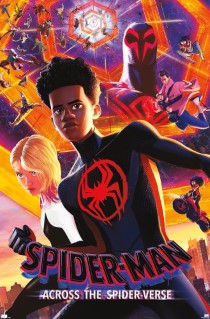 Year: 2023
Year: 2023
Director: Joaquim Dos Santos, Kemp Powers, Justin K. Thompson
Stars: Shameik Moore, Hailee Steinfeld, Oscar Isaac, Issa Rae, Jason Schwartzman
Rating: PG
Spider-Man: Across the Spider-Verse webs its way into a far more jaded world, one overstuffed with superhero sequels, and specifically, multiverse storytelling. And yet Spider-Man: Across the Spider-Verse swings in and, yet again, wipes the floor with its genre brethren by presenting a sequel that is both kinetic and deeply emotional. The script by Phil Lord, Christopher Miller and Dave Callaham (Shang-Chi and the Legend of the Ten Rings) smartly builds upon the foundation of its already established characters, their relationships and the ongoing consequences from the first film to further explore the lives of secret teen superheroes Gwen Stacy (Hailee Steinfeld) and Miles Morales (Shameik Moore) a year after the first film. The writers do so with a clear agenda to not only best themselves visually, but by upping the game of the now-familiar multiple-timeline tropes. Together with the talents of directing team Joaquim Dos Santos (The Legend of Korra), Kemp Powers (Soul) and Justin K. Thompson (Into the Spider-Verse), Across the Spider-Verse—across the board—swings for the cinematic fences in the rare sequel that feels like every frame has been crafted with the intention of wringing every bit of visual wonder and emotional impact that the animators, the performers and the very medium can achieve. The hybrid computer-animation meets hand-drawn techniques established in the first films returns with a more sleek execution that’s a bit easier on the eyes, which affords the animators to get even more ambitious with their array of techniques and character-centric presentations. The depth and breadth of the animation and illustration styles are jaw-dropping. There are frames you just want to fall into, they’re so beautifully rendered and conceived. If there’s any critique, it’s that the more action-centric sequences are almost too detailed, so that the incredible work of the animators moves off-screen so quickly that you feel like you’re not able to fully appreciate everything coming at you. As a middle film in the trilogy (Spider-Man: Beyond the Spider-Verse is due in theaters in 2024), it’s a joy to be able to say that Across the Spider-Verse stands well on its own, based on the merits of its story and stakes. There’s also a killer cliffhanger that sets the stage for a third chapter that doesn’t feel like it’s cheating its audience like some other recent films have done (cough Dune cough). In fact, repeat viewings of Across the Spider-Verse to bridge the gap until the final installment next year sounds like a great way to savor this film as it so richly deserves.—Tara Bennett
5. Okja
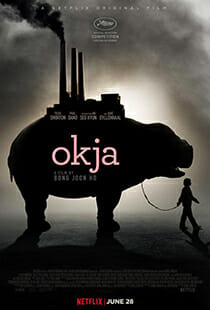 Year: 2017
Year: 2017
Director: Bong Joon-ho
Stars: Tilda Swinton, Paul Dano, An Seo Hyun, Byun Heebong, Steven Yeun, Lily Collins, Yoon Je Moon, Shirley Henderson, Daniel Henshall, Devon Bostick, Woo Shik Choi, Giancarlo Esposito, Jake Gyllenhaal
Rating: NR
Okja takes more creative risks in its first five minutes than most films take over their entire span, and it doesn’t let up from there. What appears to be a sticking point for some critics and audiences, particularly Western ones, is the seemingly erratic tone, from sentiment to suspense to giddy action to whimsy to horror to whatever it is Jake Gyllenhaal is doing. But this is part and parcel with what makes Bong Joon-ho movies, well, Bong Joon-ho movies: They’re nuanced and complex, but they aren’t exactly subtle or restrained. They have attention to detail, but they are not delicate in their handling. They have multiple intentions, and they bring those intentions together to jam. They are imaginative works that craft momentum through part-counterpart alternations, and Okja is perhaps the finest example yet of the wild pendulum swing of a Bong film’s rhythmic tonality. Okja is also not a film about veganism, but it is a film that asks how we can find integrity and, above all, how we can act humanely towards other creatures, humans included. The answers Okja reaches are simple and vital, and without really speaking them it helps you hear those answers for yourself because it has asked all the right questions, and it has asked them in a way that is intensely engaging. —Chad Betz
6. Looper
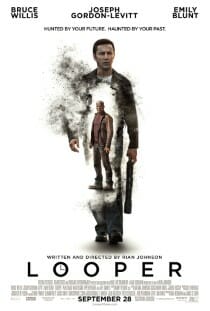 Year: 2012
Year: 2012
Director: Rian Johnson
Stars: Bruce Willis, Joseph-Gordon Levitt, Emily Blunt, Paul Dano, Noah Segan
Rating: R
Joseph-Gordon Levitt channels his inner badass to act as the younger version of Bruce Willis, nailing (with the help of some CGI and prosthetics) Willis’s ubiquitous action presence. The best case made on film for “If time travel is outlawed, only outlaws will have time travel!”, writer/director Rian Johnson wisely treats the tech as a given, focusing instead on the dramatic scenarios humans’ use of it would create. The result is one of the more thrilling time-travel-infused flicks of the last few decades, ably merging its paradoxes with a story about whether human change is ever truly a real possibility. —Jim Vorel
7. Black Mirror
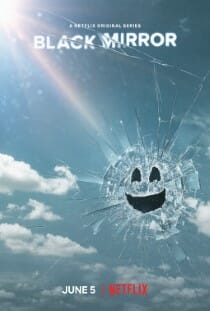 Year: 2011-2019
Year: 2011-2019
Creator: Charlie Brooker
Rating: N/A
There are probably times in most of our lives when we see our technological world as more of a dystopia than a utopia. The way it curbs our freedom, diminishes our privacy, and subjects us to anonymous attacks can feel like an unforgivable violation. But the worst part is, we’re complicit—we’ve accepted the intrusion, and in some cases, or even most cases, we’ve become addicted. The ubiquity of technology is a reality that we can’t fight against, and to maintain our sanity, we have to accept it. But that doesn’t mean it’s not worth questioning, which is exactly what Black Mirror is all about. The title is nearly perfect, as explained by creator Charlie Brooker: “The black mirror of the title is the one you’ll find on every wall, on every desk, in the palm of every hand: the cold, shiny screen of a TV, a monitor, a smartphone.” The job of this show is to reflect our society in an unflattering light, and they do it with a new cast and a new story in each episode. This is not fun watching—it’s mostly horrifying—but even if our brave new world is inescapable, the show represents a kind of protest that feels more necessary than ever. —Shane Ryan
8. Mobile Suit Gundam: Char’s Counterattack
 Year: 1988
Year: 1988
Director: Yoshiyuki Tomino
Stars: Toru Furuya, Shuichi Ikeda, Hirotaka Suzuoki, Maria Kawamura, Nozomu Sasaki, Koichi Yamadera
Rating: TV-14
The first Gundam theatrical film and final chapter in the original saga begun in 1979 with the “Universal Century Timeline” of the Mobile Suit Gundam TV series, Char’s Counterattack has the weight of three seasons of TV behind it. Yoshiyuki Tomino, creator of the Gundam series, directed and wrote the film, adapting it faithfully from his novel, Hi-Streamer. Widely considered the best film in the Gundam franchise, Char’s Counterattack is most successful at wrapping up the 14-year rivalry between the “hero” of the Earth Federation, Amuro Ray, and the leader of Neo-Zeon, Char Aznable. The story involves a classic Gundam dilemma: Char’s Neo-Zeon force attempts to drop an asteroid filled with nuclear weapons onto Earth, which would free the colonies from the yoke of oppression by their rivals, the Earth Federation, and kill everyone on Earth in the process. As with all of the best Gundam tales, Tomino approaches the story from a hard sci-fi point of view, clearly laying out the science behind things like giant mobile suits and “newtypes” (humans that have evolved to acquire psychic abilities). Tomino carefully lays out the reasoning behind Char and Amuro’s passions and hatreds, not allowing the viewer to choose a clear side. Gundam series have always been willing to take on discussions about the horrors of war and how mankind, for all its advancements, never seems to be able to free itself from humanity’s baser instincts. Char’s Counterattack attempts this as well, yet it’s mostly concerned with wrapping up the rivalry between Amuro and Char—and on that note, it succeeds wildly. Featuring gorgeous, tense fight sequences set in space, an excellent soundtrack by Shigeaki Saegusa, and some of the most lauded Gundam designs in the history of the franchise, the film is inarguably one of the high points of the Gundam Universe. One downside: If you don’t have the investment of spending hundreds of episodes of television with these characters, the plot can be confusing, and Char/Amuro’s ending will likely not resonate as strongly. Regardless, Char’s Counterattack remains a key moment in the Gundam universe, one still worth checking out almost 30 years later. Hail Zeon! —Jason DeMarco
9. The Mitchells vs. The Machines
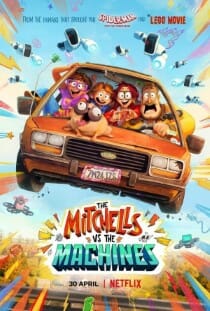 Year: 2021
Year: 2021
Director: Mike Rianda
Stars: Danny McBride, Abbi Jacobson, Maya Rudolph, Mike Rianda, Eric Andre, Olivia Colman, Fred Armisen
Rating: PG
Animated generational divides have never been more like a sci-fi carnival than in The Mitchells vs. the Machines. Writer/director Mike Rianda’s feature debut (he and co-writer/director Jeff Rowe made their bones on the excellently spooky, silly show Gravity Falls) is equal parts absurd, endearing and terrifying. It’s easy to feel as lost or overwhelmed by the flashing lights and exhilarating sights as the central family fighting on one side of the title’s grudge match, but it’s equally easy to come away with the exhausted glee of a long, weary theme park outing’s aftermath. Its genre-embedded family bursts through every messy, jam-packed frame like they’re trying to escape (they often are), and in the process create the most energetic, endearing animated comedy so far this year. —Jacob Oller
10. Godzilla
 Year: 2014
Year: 2014
Director: Gareth Edwards
Stars: Aaron Taylor-Johnson, Bryan Cranston, Ken Watanabe, Elizabeth Olsen, Juliette Binoche, Sally Hawkins, David Strathairn
Rating: PG-13
The rebooted American Godzilla by Gareth Edwards struggles between two aspirations, to channel the gravitas and meaning of the 1954 original and also satisfy a popcorn-crunching audience of American action movie fans who just want to see some stuff get blowed up real good. At its best, it gives in to the pulpy ridiculousness of being a film about giant monsters, simply stepping back for a second to let the beautifully rendered creatures become the stars. At its worst, it bogs down in endless human drama that is devoid of meaning, following the wrong protagonists (why kill Bryan Cranston? Why?) as they struggle to rescue nameless children and the audience wonders why it should care. A number of awesome moments in the final 30 moments help propel this launch of Legendary’s MonsterVerse up the list, and the film particularly benefits from its sense of scale and awe toward Godzilla in particular, but just as often it frustrates by teasing the audience with expected confrontations that don’t actually happen. It’s a mixed bag, but one that has grown in our esteem in the years since it was first released. Of the modern American Godzilla films, it easily pays the most respect to Godzilla as a character and a force of nature. —Jim Vorel
11. The Platform
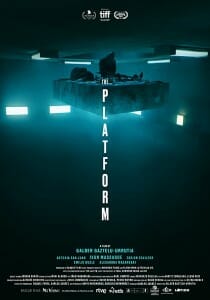 Year: 2019
Year: 2019
Director: Galder Gaztelu-Urrutia
Stars: Iván Massagué, Zorion Eguileor, Antonia San Juan, Emilio Buale Coka, Alexandra Masangkay
Rating: NR
The Platform benefits immensely from the strength of its simple, high-concept premise and all the superfluous information that is withheld from the viewer. It doesn’t matter that we don’t know why exactly people are placed into this diabolical, vertical prison structure, in which the only sustenance arrives once a day in the form of a steadily descending, increasingly gross stone slab piled high with perishables. Nor do we really need to know how this apparent social experiment operates, although the repeated glimpses we get at cooks slaving over perfect dishes to be sent down to the doomed convicts is no doubt designed to needle at our curiosity. What matters is that we observe the differences in human reaction to this plight—the ways that different personalities react to adversity with an “us or them” mentality, or a predatory hunger, or a spontaneous drive toward self-sacrificing altruism. The fact that the position of the prisoners is constantly in flux is key—it gives them both a tangible reason to be the change they want to see in their world, and an almost impossible temptation to do the exact opposite out of distrust of their neighbors. One expects a nihilistic streak here, and you won’t be disappointed—but there’s a few glimmers of hope shining through the cracks as well. Just enough, perhaps, to twist the knife that much deeper. —Jim Vorel
12. They Cloned Tyrone
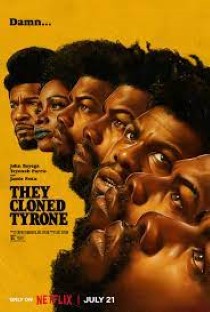 Year: 2023
Year: 2023
Director: Juel Taylor
Stars: John Boyega, Jamie Foxx, Teyonah Parris, Kiefer Sutherland, David Alan Grier
Rating: R
There are period films that revel in accumulating accurate and/or eye-catching details of production design and costumes to evoke a particular era, and science-fiction films that world-build with all of the imagination their budget can afford (though maybe not as many of those as we’d like). Juel Taylor’s They Cloned Tyrone occupies a fascinating middle ground between the two: A more-or-less contemporary movie that looks like a period piece, and a sci-fi picture that stashes its wildest elements underground, sometimes literally. It has a tinge of Blaxploitation that stops shy of parody–a visual sense underlining the way that urban neighborhoods can be left behind as time marches on, lending them a sense of both neglect and integrity. The heart of the film is right there in the title, in more ways than one. It both tips the movie’s hand about the broad outline of where the movie is going – yes, literal clones are involved – and is cleverly elusive about the specific meaning (no, none of the main characters are named Tyrone). Nonetheless, there are times when the sci-fi plotting feels secondhand, and not up to its seeming influences: Sillier and less thrilling than a Jordan Peele horror-thriller, not as comically audacious as the Boots Riley comedy Sorry to Bother You, less charmingly handmade than a Michel Gondry movie. On a scene-by-scene basis, though, They Cloned Tyrone is well-crafted entertainment, buoyed by its three major performances—the taciturn drug dealer Fontaine (John Boyega), the goofier local pimp Slick Charles (Jamie Foxx) and the Nancy Drew-inspired prostitute Yo-Yo (Teyonah Parris). Boyega affects a stoic movie-star minimalism in the tradition of Clint Eastwood or the more restrained performances of Tommy Lee Jones, making his brief moments of levity all the more effective. Foxx, outfitted in stereotypical pimp gear, makes a potentially doofus-y (or even, depending on the context, kind of vile) character likable in his oddly chipper demeanor and oddball references. (In general, the movie’s pop-culture references are just about perfect: Not obscure for obscurity’s sake, but left-of-center enough for genuine novelty.) And Parris in particular feels like a revelation, a firecracker amateur detective who knows her way around funny banter. A wider release of this Netflix movie might have made her a star. What sets the movie apart from so many post-Get Out sociological thrillers, though, is the cleverness and style of the path Taylor lays out for his endearing characters. —Jesse Hassenger
13. Oxygen
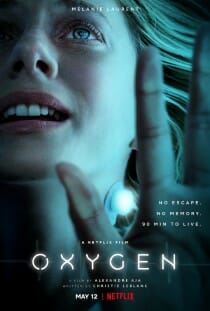 Year: 2021
Year: 2021
Director: Alexandre Aja
Stars: Mélanie Laurent, Mathieu Amalric, Malik Zidi
Rating: NR
If you decide to watch the new sci-fi horror offering Oxygen during your latest Netflix and chill, allow me to impart a word of caution: This film isn’t what you think it is. Alexandre Aja, the acclaimed New French Extremism director responsible for the subgenre’s classic Haute Tension, is known for just that: Extremism. He’s no stranger to pushing his characters into heightened, blood-curdling scenarios where the very fabric of their beings dangle at impossibly high stakes. But where Oxygen differs from the rest of his work is that, ultimately, it is a love letter to human survival—a horrorshow with catharsis running through its veins. A woman (Mélanie Laurent), awakens in a cryogenic chamber with no memory of her identity or how she got there. M.I.L.O. (Mathieu Amalric), the pod’s onboard computer system, informs her that she has only 33 percent left in her oxygen reserve. We only see the inside of this pod, making her true location a terrifying unknown. Needless to say, escape couldn’t be more critical. —Lex Briscuso
14. Vivarium
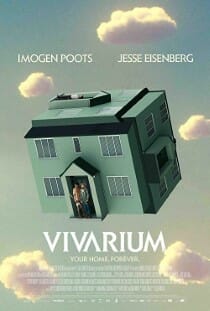 Year: 2020
Year: 2020
Director: Lorcan Finnegan
Stars: Jesse Eisenberg, Imogen Poots
Rating: R
A quirky real estate story, where first-time homeowners Tom (Jesse Eisenberg) and Gemma (Imogen Poots) get a lot more than they bargained for, Vivarium is a low-key sci-fi nightmare of the mundane in the vein of early David Cronenberg. Director Lorcan Finnegan’s film also functions as a relationship allegory, where Tom and Gemma find themselves stuck in a trendy neighborhood of cookie-cutter homes where starting a family isn’t just an expectation but something foisted upon them. It isn’t as grisly as something like Shivers, but more affecting in its surreal design and hopelessness. Eisenberg and Poots own the screen as a disintegrating couple coping in distinct ways to their newfound terrarium where they are observed, manipulated, and—perhaps most disturbingly of all—objectively provided for by unseen and undefinable forces. Its 2020 release feels especially fitting as repetition and hopelessness become permanent residents of the couple’s home. Genre elements seep into the film, accelerating in hiccups and starts that are as arresting as the film’s intentionally artificial design. Startling sound dubbing, odd colorizing, and a few genuine “Oh shit” moments make Vivarium a tight, nasty fable that would fit in with the best Twilight Zone episodes. —Jacob Oller
14. The Midnight Sky
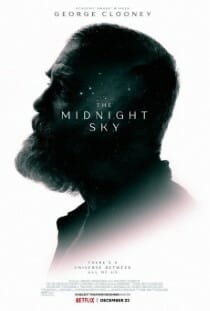 Year: 2020
Year: 2020
Director: George Clooney
Stars: George Clooney, Felicity Jones, David Oyelowo, Tiffany Boone, Demian Bichir, Kyle Chandler, Caoilinn Springall
Rating: PG-13
Set in 2049, The Midnight Sky is a meditative journey which sees our planet as a rapidly decaying wasteland and the expanse of space as a dangerous, yet hopeful, new frontier. Cutting between the Arctic and an elaborate spaceship called the Aether, the film follows dying scientist Augustine Lofthouse (George Clooney) as he races to warn those upon the Aether to abandon their return to Earth, after an alluded to cataclysmic event renders most of the world uninhabitable. Although it has its share of cliches, it remains a gripping, chilling story throughout—one that strikes a little too close to home in the context of 2020. —Joseph Stanichar
16. The Old Guard
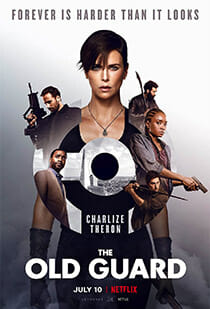 Year: 2020
Year: 2020
Director: Gina Prince-Bythewood
Stars: Charlize Theron, Kiki Layne, Matthias Schoenaerts, Chiwitel Ejiofor, Van Veronico Ngo, Henry Melling, Marwan Kenzari, Luca Marinelli
Rating: R
Gina Prince-Bythewood, given a budget more than worthy of the best DTV action flick anyone could hope could make it to permanent Netflix browsal, succeeds in towing, and then mildly subverting, the genre line: She proves she can capably steer a high-concept action blockbuster while cobbling together something that feels like the kind of movie “they” just don’t make anymore. All of it amounts to a one-step-forward-one-step-back appraisal: There is much to cull from the travails of Andromache the Scythian (Charlize Theron), an immortal warrior who, thousands of years later, still questions the purpose of her own endlessness, and sequels, given Netflix’s ostensibly unlimited resources, are all but guaranteed—but one wishes for more capably clear action auteurism, even when Prince-Bythewood’s action chops confidently step up. Still: There are countless joys to behold in The Old Guard, most of all the emergence of Kiki Layne—last seen as hyper-dramatic personae #1 in If Beale Street Could Talk—as exceptionally promising action star, executing a one-handed pistol cocking so confident and so unremarked-upon it automatically achieves cinematic canon. Otherwise, trigger-happy editing gets in the way of itself too often, admirable set-pieces sometimes chopped to shit, though plenty of violence—squelching and tendon-splitting—abounds, and the final villain is dispatched with such disregard for the human body that one can’t help but applaud Prince-Bythewood for getting it—for knowing that the key to good action filmmaking is treating the human body like a pile of wet meat. —Dom Sinacola
17. Don’t Look Up
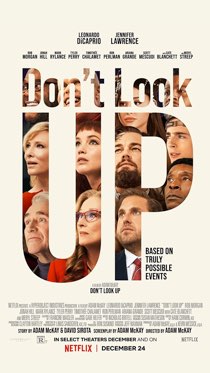 Year: 2021
Year: 2021
Director: Adam McKay
Stars: Leonardo DiCaprio, Jennifer Lawrence, Rob Morgan, Jonah Hill, Mark Rylance, Tyler Perry, Meryl Streep
Rating: R
In 2021, there are more reasons than one might have been previously comfortable with for legitimately fretting about the end of the world. And while the downfall of humankind likely won’t be coming as expediently as an extinction-level threat heading on a crash course for Earth, director Adam McKay’s new doomsday comedy/“timely” political satire Don’t Look Up attempts to congeal populism and the pandemic and climate change and all that which causes us to recoil against the unknowable future into one immediate, planet-killing orb. If that seems like a better and quicker way for us to go out in retrospect, McKay doesn’t make the path towards potential desolation easy. He plays out scenarios that, now, come across less like Idiocracy and more like genuine, scientific hypothesizing about how our world would react to the knowledge that we have six months left to live. Businessmen and politicians would attempt to financially leverage the situation at the cost of human lives; brainless hashtags would proliferate on social media; half the population would believe it to be a hoax; and the people who broke the story would be branded as cranks…to some extent. So, who better to articulate this existential dread at large than resident Hollywood goofball comedy director-turned-political theorist McKay, in his first wholly fictionalized film since Anchorman 2: The Legend Continues? The result is a star-studded Netflix affair. The film isn’t bad; it’s just boring, and long. There is no reason that a comedy—even a purported “prestige” one—needs to run 145 minutes (though I have a feeling that Judd Apatow would beg to differ). I can imagine an alternate universe where Don’t Look Up was a sharper affair, if not a better one, trimmed down to two hours, or even a scant 100 minutes, which would alleviate the weight of the burdensome political satire and, perhaps, even the long-winded non-jokes. As is, Don’t Look Up is an exhausting and meandering “What if? But also, what now?” If the world really is going to end in my lifetime, these were 145 minutes that I’m never getting back. —Brianna Zigler
18. Space Sweepers
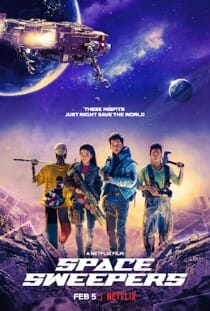 Year: 2021
Year: 2021
Director: Jo Sung-hee
Stars: Song Joong-ki, Kim Tae-ri, Jin Seon-kyu, Yoo Hae-jin
Rating: NR
Netflix introduced its audience to Southeast Asian big-budget sci-fi with the Chinese film The Wandering Earth, a mess of a story that was still beautiful to look at. Space Sweepers, from Korean filmmaker Jo Sung-hee, is a much more cohesive and coherent offering with just as much flash. The dystopian setting sees the head of a giant tech company creating an Eden on Mars, essentially consigning most of humanity to poverty and pollution. A ragtag team of space-junk collectors is each looking after their own self-interest when they find a mysterious young girl who entangles them in much larger worries. With compelling characters, thrilling action sequences and an engaging plot, it’s a strong entry for Korea’s first sci-fi blockbuster. —Josh Jackson
19. Blame!
 Year: 2017
Year: 2017
Director: Hiroyuki Seshita
Stars: Sora Amamiya, Kana Hanazawa, Takahiro Sakurai
Rating: TV-14
When it comes to dark industrial sci-fi, Tsutomu Nihei is a visionary. Trained as an architect before pursuing a career as a manga author, Nihei’s art is simultaneously sparse and labyrinthine, his body of work defined by a unifying obsession with invented spaces. Byzantine factories with gothic accents spanning across impossible chasms, populated by bow-legged synthoids and ghoulish predators touting serrated bone-swords and pulsating gristle-guns. His first and most famous series, Blame!, is considered the key text in Nihei’s aesthetic legacy, going so far as to inspire everything from videogames, to music, and even art and fashion. Past attempts have been made to adapt the series into an anime, though none have been able to materialize successfully. That is, until now. With the support of Netflix, Hiroyuki Seshita of Polygon Pictures has delivered that long-awaited Blame! film. Set on a far-future Earth consumed by a massive, self-replicating superstructure known as ‘The City’, Blame! follows Killy, a taciturn loner, wandering the layers of the planet in search of a human possessing the ‘net terminal gene,’ an elusive trait thought to be the only means of halting the city’s perpetual hostile expansion. Boasting a screenplay penned by Sadayuki Murai, famed for his writing on such series as Cowboy Bebop and Satoshi Kon’s Perfect Blue, and supervised by Nihei himself, Seshita’s film abbreviates much of the manga’s early chapters and streamlines the story into an altogether more narrative and action-driven affair. Art director Hiroshi Takiguchi deftly replicates Nihei’s distinctive aesthetic, achieving in color what was before only monochromatic, while Yuki Moriyama capably improves on the uniform character designs of the original, imparting its casts with distinct, easily identifiable traits and silhouettes that greatly improve the story’s parsability. Blame! is as faithful an adaptation as is possible and as fitting an introduction to the series as the manga itself. Blame! builds a strong case for being not only one of the most conceptually entertaining anime films of late, but also for being one of, if not the best original anime film to grace Netflix in a long time. —Toussaint Egan
20. Spiderhead
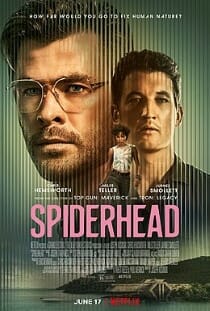 Year: 2022
Year: 2022
Director: Joseph Kosinski
Starring: Miles Teller, Chris Hemsworth, Jurnee Smollett, Mark Paguio, Tess Haubrich
Rating: R
Paste’s Steven Petite called George Saunders “a master of creating worlds that are close enough to mirroring our own to be deemed realistic while not familiar enough to entirely resemble the world we live in” and “perhaps the greatest living English language short story writer, whose bizarre brand of humor is both dark and refreshing.” Netflix’s Spiderhead, adapted from Saunders’s 2010 short story “Escape from Spiderhead,” is darker than it is funny (or fun), but it is refreshing to watch Chris Hemsworth drop his superhero persona to play a mad genius running an unorthodox prison where the inmates have volunteered as lab rats in exchange for good meals and personal space. Directed by Tron: Legacy’s Joseph Kosinski, the film imagines a future where changing someone’s mood and perception is as easy as an iPhone app and oversight of our private prisons is—well, even less than it is today. Miles Teller and Jurnee Smollett star as inmates who begin to question whether life back in gen pop was actually better. —Josh Jackson